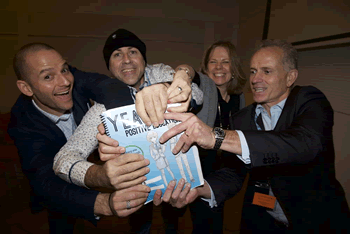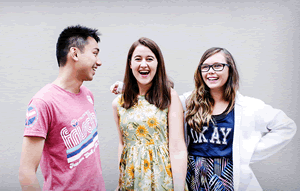 Over the past decade, there have been significant changes in the attitudes and practices around wellbeing programs in Australian Schools. Two people who have been observing – and indeed helping shape these changes – are Dr Helen Street and Neil Porter, the creators of the annual Positive Schools Conferences. Positive Schools has grown from a single Western Australia conference with 250 attendees in 2009 to the current season of four conferences in Western Australia, Queensland, Victoria and New South Wales that will be attended by close to 3000 educators.
Over the past decade, there have been significant changes in the attitudes and practices around wellbeing programs in Australian Schools. Two people who have been observing – and indeed helping shape these changes – are Dr Helen Street and Neil Porter, the creators of the annual Positive Schools Conferences. Positive Schools has grown from a single Western Australia conference with 250 attendees in 2009 to the current season of four conferences in Western Australia, Queensland, Victoria and New South Wales that will be attended by close to 3000 educators.
Justin Robinson, Director of the Institute of Positive Education, has been presenting on the importance of positive teacher-student relationships at this year’s conferences, and in between sessions in WA, managed to sit down with Helen and Neil to discuss why they started Positive Schools and the changes they have seen over the past eight years.
“I’d been working in schools as an academic for a bit looking at things like motivation and wellbeing in children”, said Helen, “and saw all these practices that seemed very out of line with the research. I did a survey at that time of what was happening in schools and wellbeing programs, and identified over 160 different programs, and some of them had good support, but a lot were just colourfully marketed and it seemed that teachers were making decisions on the basis of anecdotal evidence and good marketing as opposed to grounded evidence.” After much discussion and several successful trial workshops, Helen and Neil decided to create a conference that would help bridge the gap between what academic research and clinical practice was saying and what was being done in schools.
In the early years, Helen and Neil found that many of the audience members still had to be convinced of the benefits of wellbeing education. According to Helen, “There was an awful lot of emphasis on why social emotional learning’s important, what is wellbeing, how can we define it, is it different to happiness, why is it important?” However, recently, the feeling is that more and more schools have accepted wellbeing as a priority, which allows the conference organisers to attract speakers who can explore key wellbeing topics in more depth as well as challenge the audience.
One such speaker for this year’s conference is Alfie Kohn, a father of two and author of 14 books on human behaviour, parenting and schooling. David Bott, our Head of Positive Education, saw Alfie speak at Positive Schools Queensland and was part of a discussion panel afterwards. David shares his reflections below:
“Given his penchant for challenging the status quo, Alfie’s keynote presentation on Day 1 of this year’s Positive Schools Conference promised to be exciting, challenging and provocative. And he sure didn’t disappoint!
Presenting via Skype from the US to a room of over 700 educators at the Brisbane Convention Centre, Alfie began his talk with a barrage of criticism for the way schools exploit rewards and punishments. Whatever you want to call them, says Alfie, rewards are ‘bribes’ and punishments are ‘threats’, both designed to exert power over children to control them. What schools that utilise rewards and punishments are really teaching children about life, claims Alfie, is that people in positions of power use that power to get less powerful people to do what they want. It’s the ‘doing to’ rather than ‘working with’ which Alfie is so critical about. Alfie joked that this is not something he ‘thought up in the shower this morning’ but actually, ‘decades of research demonstrate that rewards, like punishments, are not merely ineffective but tend to be counterproductive’. This has powerful and sometimes counter-intuitive consequences for the way we raise and educate children. For example, interacting with a child by verbally rewarding her for being generous actually makes that child ‘a little more selfish than she had been before the interaction’. Doesn’t that make you stop and think for a minute!
Alfie’s critique of rewards and punishments didn’t only focus on behavioural outcomes. In terms of learning and achievement, Alfie cited extensive research highlighting the detrimental effect that rewards have on performance. This is particularly true of challenging tasks requiring ingenuity. The more creativity required to complete a task, ‘the more rewards tend to undermine the quality of performance. This is why the best schools do not give grades that could be construed by students as a reward for performance.’
Whether or not teachers and educators agree with Alfie’s views, his ability to provoke thought and debate and to shine a light on engrained ‘ways of doing things’ in schools is immensely valuable.”
This year, conference organiser, Helen Street was also on stage, talking about ‘Classroom Glue’. Justin Robinson shares his reflections on Helen’s presentation:
“Do we make decisions based more on our individual beliefs or more on the beliefs of our group? This thought provoking question led Helen’s presentation on helping us to recognise, understand and account for the importance of the group environment and the existing social norms as we as teachers endeavour to create enriched learning environments and support our students to flourish. It was suggested that so many of our decisions, beliefs and values are dictated by our connection to others and our desire to want to behave in a normal and acceptable way.
With this in mind, Helen stressed the importance for a teacher to build class cohesion, which she formally defined as ‘the social and emotional glue that transforms a class from a collection of individuals into a group of social beings.’ I couldn’t help but find myself agreeing with the concept that I am just as much a social being as an individual and that so many of my ideas and thoughts are influenced by my culture, my community and my colleagues.
It was generally agreed that classroom cohesion will not simply happen by itself and we were all encouraged to dedicate time to build classroom glue. Referencing her own research Helen explained that students own subjective wellbeing levels can be predicted by how connected they feel to other students in the class, the sense of belonging they feel to the class and how emotionally and physically safe they feel in the class. Helen suggested that the most important time to build class cohesion is when the class is least cohesive. For example, the first week of the school year is more important than any other week, the first week of the term is more important than the other weeks, Monday is more important than Friday and the first five minutes of the class are more important for class cohesion than the other minutes.
Many practical tips to assist students to build class cohesion were discussed, including: really knowing your students, showing some vulnerability and letting your students know you, playing cooperative games, incorporating an array of fun brain breaks, providing opportunities for collaboration, using age appropriate humour, including class celebrations and providing students with choice and autonomy whenever possible. The language the teacher uses is vitally important and as an Institute, we fully support the notion of teachers minimising the use of first person individual pronouns such as ‘I’, ‘me’ and ‘my’ and instead prioritising first person plural pronouns such as ‘we’, ‘us’ and ‘our’.
Another wise piece of advice to teachers was that, prior to collaboratively establishing class rules, the class should collectively set class goals, both academic as well as social and emotional. This agreement provides an excellent foundation for then agreeing on rules that would help the class to achieve these goals. The ongoing challenge then remains in transferring the classroom rules to consistent classroom behaviours and ensuring the social norms of the class are in line with the rules.
Helen emphasised that school wellbeing programmes must consider the wider social context and need to be tailored and customised to maximise success, a point we often make within our own training courses. To conclude her discussion on how we are first and foremost social beings, Helen provided a very rich and helpful description of flourishing as ‘the interplay between our best individual self and our best social self’ and that to be flourishing we must find our own voice as well as connect to the fabric of our society.”
Positive Schools 2016 continues over the next fortnight, with tickets still available for Positive Schools VIC (2-3 June) and NSW (9-10 June). As an Institute, we are proud of our ongoing association with Positive Schools, and feel it is so important for educators to take time out from their busy schedules to attend such events, meet with their peers, and reflect on both their own current teaching practice and the overall future of education.
We are also excited to announce that we will be bringing both Alfie Kohn and Helen Street to Geelong this November as part of our Insight Series. Book before 24 June to attend both of these inspiring and challenging events for the early bird price of $200 + GST.
Justin Robinson
Justin Robinson is the inaugural Director of the Institute of Positive Education. As a passionate leader in the field of student and staff wellbeing, Justin has been invited to write for a number of publications and speak at conferences both in Australia and around the world.
David Bott
David Bott is Head of Positive Education at Geelong Grammar School. In 2011 David completed his PGradDip in Psychology and co-authored his first book, “Teach Positive: applying the science of positive psychology to the classroom”.


